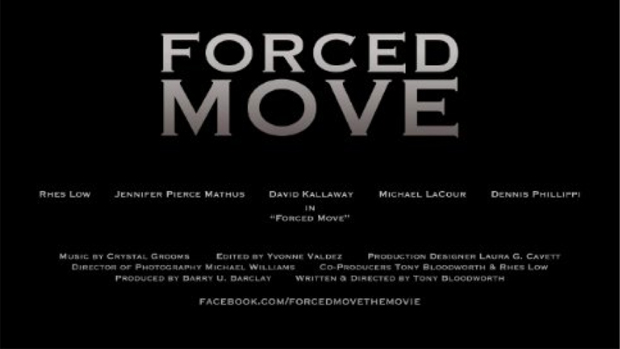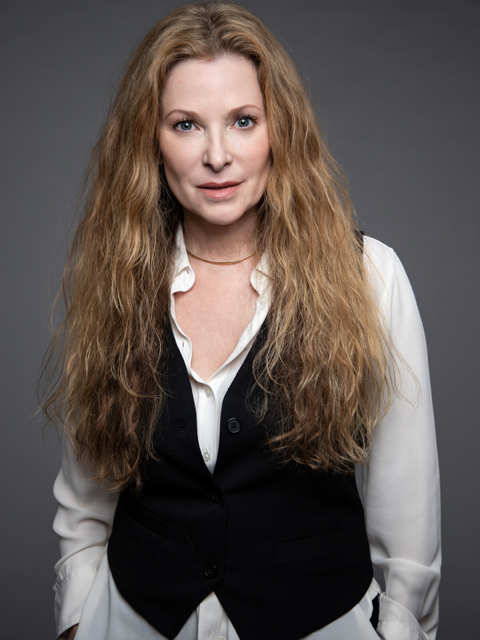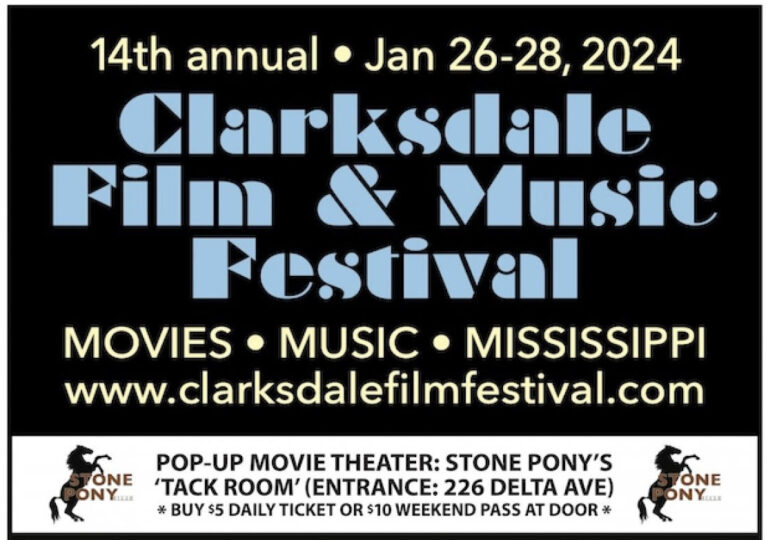
GEDSC DIGITAL CAMERA
Forced Move, which makes its world premiere this year at The Oxford Film Fest, written and directed by Tony Bloodworth, tells the story of John and Gail Parsons, a seemingly quiet, normal couple, whose marriage is falling apart beneath the facade. Their already troubled lives are disrupted irreversibly by the intrusion of two mysterious and dangerous strangers into their quiet community. When John discovers a series of brutal murders on his morning jog, he realizes his home is next in the path of the killers, and he must race home to save his family. Shot entirely in Water Valley, Miss., Forced Move is a tense, dramatic experience that should not be missed. TLV‘s Caleb Fisher-Wirth caught up separately with Tony Bloodworth and the film’s co-stars Rhes Low and Jennifer Pierce Mathus, to get the inside scoop.
Tony Bloodworth

What was your first filmmaking experience?
My first filmmaking experience was at the University of Memphis. I came from a really small town up on the Tennessee/ Kentucky border, so it wasn’t a town where you could make movies necessarily. This was before the proliferation of DSLR cameras and things like that, so it was a little harder to get a hold of equipment. I had been interested since… Well, I’ll tell you the movie that got me interested was Raiders of the Lost Ark, because I saw it as a kid, and I really liked it to the point I wanted to be an archaeologist. And then I started looking into what that meant, and I found out that it wasn’t really like in the movies. But as I grew older, I thought, “I’d like to give people that feeling that I had from watching that movie.”
What were some of your first projects?
I don’t remember much of the stuff I did as a student, simply because it probably wasn’t that good. I didn’t really make films that I feel proud of until after I got out of school. The first short film that I made was a film called flipping coins. It starred JW (Williams), who is in Forced Move. I think it’s a good first stab at filmmaking. Then I did a project called Coming Through that had a little bit of play on the Internet in the late 90s/ early 2000s. That was the first one I got a really good audience reaction for; it was a comedy about a guy going to a video store to get an adult film. The first film that really broke through on the film festival circuit was a film called Seeing, which you can find on YouTube. It was a vampire story.
What was your inspiration for the project?
We wanted to do a feature, and I had this idea, this image of a man running on a rural back-road to try to save his family. We wanted an idea that we could actually do with the resources that we had.
What are some of your influences as a writer/ director?
They’re kind of all over the map. For a suspense film like Forced Move, I’d say John Carpenter, Michael Mann… Anybody my age who says they aren’t influenced by Steven Spielberg and Martin Scorcese are lying. [laughs] If you ever saw a comedy, that would be a whole different list.

How did you choose Water Valley as your principle location?
We knew we wanted to shoot in Miss., because it fit the story and we had people there, Rhes (Low) among them. We quickly latched onto Water Valley. They sent me a lot of pictures and I just fell in love with it. It came together very quickly. Everybody there was really cool and helpful. Could not have done it without the town of Water Valley for sure.
What was your process in hiring your cast and crew?
We had known Rhes for a long time, and I could see his face in the lead role. The other cast was a mixture of different processes. We had auditions, that’s where we came to Jennifer Pierce Mathus. But there were other actors such as JW and David Kallaway, who I had worked with in the past. We had one audition in the Memphis area, and one in the Oxford area. But most people came from the Oxford auditions.
We had heard about (director of photography) Micheal Williams from (production designer) Laura Cavett, and we really liked his work. We’re really glad we went with him, he did a great job. Obviously, (gaffer) Casey Spradling’s death (several months after completion of Forced Move) was incredibly tragic. I didn’t know him previous to the film, but I think everybody that ever met him really loved him. Really really good guy, and it just shocked us all when we heard what happened. It’s one of those that you can’t wrap your mind around, he was a really cool, talented guy.

What would you like people to take away from viewing Forced Move?
You’d like them to be entertained, to enjoy the film. I’d like to have them on the edge of their seats, but walk away with the sense of “That was a really good story, told really well.” It sounds simple, but that’s it. We’ve had a few screenings, and they’ve been very positive, so I’m very happy with the final product.
And lastly, if there was a single most talented and best looking member of your grip department, who would you say that would have been?
[Laughs]. Hmm, boy, that sounds like a loaded question. The whole grip department was just super talented, and oddly enough, super good looking. [Laughs] You did great, man, we were happy to have you on the project.
Rhes Low

What was your first acting experience, and when did you realize that you wanted to take it seriously as a profession?
First acting experience, I was part of the Lollipop Guild in The Wizard of Oz. They used this grease paint makeup, I remember the smell of that. A few of my buddies were in it too. As far as when I knew I was going to be professional, it was always kind of a given. The only time I ever even questioned it was when I moved back here (from L.A.). Even though I was telling myself those few years I was giving it up, it was all I thought about. When I was in elementary school, I wanted to be a singer/ rockstar/ golfer/ preacher. [Laughs] So acting was a good transition. I’ve played all of those so far, except for a preacher.
How did you prepare for the role of John Parsons?
I ran a lot. Not for a look, but to get in the mindset. I wasn’t running to slim up, but to create endurance for what I knew would be a lot of sprints. I hate to use the term ‘dull,’ but I wanted him to be just a very ordinary, kind of boring guy, who’s thrown into extraordinary circumstances. I also did a bunch of actorly stuff that allows you to mold yourself with what the writer has put on the page. I had a few conversations with my accountant, because I wanted to see the enjoyment in it. I couldn’t see the validation in that work at first. I had to find a way to get that. Once I talked to him, I figured out, “Wow, it’s like detective work.” I just don’t like talking about what I put into it outside of what I do. You don’t want to lift the curtain back too much [on your process], you open up a whole can of worms of explanation. And it’s also kind of egotistical, I think. If you open up the curtain, you’re not going full force with getting lost in your imagination and being lost in what’s happening.

Would you ever consider a role that required so much running again?
Sure, absolutely. I want one that pushes me even more physically, or just challenges me in some way. I’m a little old to be getting a bunch of physical roles, but I enjoy changing my body for a role and having challenges. The running was not hard, because I trained myself. There’s no way in hell that I could have done that if I hadn’t trained.
How does teaching acting influence what you bring to a performance? Do you approach your craft differently?
Yes. It’s let me re-develop a sense of play. Kids don’t have the barriers that we put up as adults, and working with them allows me to knock mine down, and to just play and go with it. You’ve gotta be able to roll with your instinct and make it work. In the past I’ve fallen in love with my research a bit too much. I loved all the homework I did. But now it’s easier for me to figure it out and really just be there and play. You can equate it to music. You get to a point where you’ve worked so hard, and played so many shows, now it’s just in your body. It’s a part of you. I always experiment, and that sometimes backfires, because you’re gonna fail a few times. But that’s what’s fun for me. Now I have to learn as an older actor, to trust my instrument, that my instincts are pretty keen. I audition a lot. What I’ve found is that if I do too much, I’m overthinking everything. There’s validity to that, but you have to be able to let it go and live instinctually.

What do you hope audiences take away from viewing Forced Move?
On the one hand, you want them to have a good time, to be thoughtful about the movie. I’m a servant to the film, but as far as my role, I wanted to be able to create the idea of an ordinary person being thrown into extraordinary circumstances, and whether or not they could stand up to the challenge. We all think that we would meet that challenge, especially when it concerns our loved ones. Few of us are ever going to experience something, and we all like to think we would be able to protect our family, but who’s to say. It’s always better not to have to.
Jennifer Pierce Mathus

What was your first acting experience, and when did you realize that you wanted to take it seriously as a profession?
I’ve always known I should be an actor. Even when conventional thought and my parents’ wishes maybe were otherwise. Nothing has ever challenged me or inspired me, just intrigued me as much as the world of filmmaking and theater. My very first stage role was Anna in The King and I as a junior in high school. I’ve tried to have the day job and work the 9 to 5 gig, and nothing inspires me as much as pursuing this art.
How did you prepare for the role of Gail Parsons?
The audition process itself was the real preparation. I was auditioning alongside of very talented Mississippi and Los Angeles actresses, and I was honored to be able to play Gail. The trick was to really get at the underbelly of her character. The beauty of how Tony directed us was we really broke down the characters before we started looking at scenes and dialogue. We had detailed back-story on everybody: where the relationships fell, who was an ally of whom, where people went to school, what music they listened to… Just really getting inside the mind and body of this person, to then look at this 24-hour scenario, and how their life can become upended in a day. I think it would be a disservice to say that she’s just the role of the wife, because there’s a lot of complex things going on beneath the surface: with her family, with her marriage, with herself.

Did you have a favorite scene, or a favorite memorable moment from the shoot?
Oh, the deer stand scene. It was the overnight shoot that we had all been watching on the schedule, we all knew it would be a long night, but it was also a very emotional set of scenes. Climbing up in the deer stand in the middle of those woods, in a kudzu valley in the middle of Water Valley, and being shot at was a brand new experience for me. It was scary, thrilling, exhausting… but absolutely well worth it!
Does being married to a fellow performer influence how you approach your work?
That was a great question actually. I’m glad that you pick up on that. I have a very kindred spirit with musicians, I have several in my family and I married Jimbo (Mathus). I love how free Jimbo is when he approaches a recording session, but he also very much knows what he wants to get out of it. The way that he approaches his work has really opened up new ways for me to look at my own work – the least of which is that he’s just so supportive of any endeavor. Making art is always top priority. He truly appreciates actors and filmmakers as artists, and it’s nice to have a partner who supports and gets that. He’s just down for the cause. I quit acting like every other day. He’s encouraged me to continue when I’ve wanted to throw in the towel.

What do you hope audiences take away from viewing Forced Move?
I want them to appreciate the professionalism that exists in the crew and cast that largely came from this state. I want people to support the local film scene. In terms of the movie itself, I really hope people appreciate the value of this story: of seemingly everyday life turned on its ear, of the complexity of relationships that appear normal to all of us. There’s such beauty and so many compelling stories that just walk alongside us every day. And I think Tony captured that. I can’t say enough about my co-stars, they’re just tremendous actors, and I try to learn from everyone I work with. I certainly learned a great deal on that set. ![]()
For more information, go to ForcedMoveTheMovie.net




